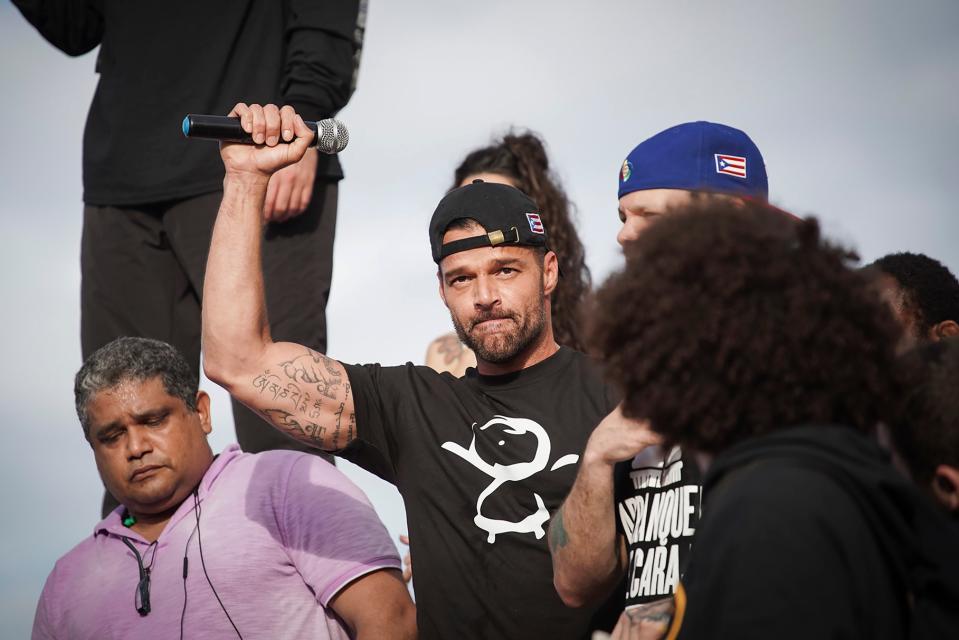Why Daddy Yankee, Lin-Manuel Miranda, and Ricky Martin Are Protesting the Puerto Rico Governor
Last weekend, Puerto Rico's Center for Investigative Journalism published an 889-page dossier of leaked text messages exchanged between governor Ricardo Rosselló and his staffers, aides, and cabinet members. They are, for a multitude of reasons, repugnant: He refers to Melissa Mark-Viverito, the Puerto Rican-born former New York City Council speaker, using a misogynist slur, and muses about the prospect of an associate shooting San Juan mayor and 2020 gubernatorial challenger Carmen Yulín Cruz. (“You'd be doing me a grand favor,” Rosselló wrote.)
In other conversations, Rosselló's chief financial officer Christian Sobrino Vega, who has resigned since the scandal broke, makes crude comments about singer Ricky Martin's sexuality and riffs on the backlogs of bodies at Puerto Rico's morgues after Hurricane Maria, which killed at least 3,000 people after devastating the island in 2017. "Don't we have some cadavers to feed our crows?" he asked, apparently referring to the administration's most persistent critics. "Clearly they need attention."
This combination of vulgar sexism, homophobia, and flippant jokes about hurricane victims has prompted daily protests since the publication of "RickyLeaks," with thousands of Puerto Ricans taking to the streets outside Rosselló's mansion to call for the governor's resignation. Martin has been among them; so has Daddy Yankee, who made a six-figure donation to Puerto Rico's food banks after Maria, and Bad Bunny, who along with fellow recording artists Residente and iLe released an anthem, "Afilando Los Cuchillos" ("Sharpening the Knives"), to serve as the movement's soundtrack. Translated to English, it includes lyrics like "Ricardo Rosselló is an incompetent, homophobic liar / A delinquent, no one wants you, not even your own people."
On the U.S. mainland, Red Sox manager Alex Cora, Astros shortstop Carlos Correa, and Cardinals catcher Yadier Molina, among other Puerto Rican baseball players, have each called for Rosselló to step down. Along with Mark-Viverito, Hamilton creator Lin-Manuel Miranda, whose parents are from Puerto Rico, attended a demonstration in New York City on Wednesday. "I'm so numb from politics in America," he told CNN. "But the people of Puerto Rico are numb, and they are waking us all up. I'm going to have their backs."
The protests in San Juan sparked violence on several occasions this week, when police clad in riot gear fired tear gas, pepper spray, and rubber bullet into the assembled crowd, allegedly in response to someone throwing fireworks. But on Tuesday, Rosselló praised law enforcement officers for their handling of the clashes and vowed not to leave his post. "I will continue my work and my responsibility to the people of Puerto Rico," he said. He acknowledged that he "committed inappropriate acts" and expressed "regret" for doing so, but asserted that he had done nothing "illegal or corrupt," and would work to re-earn the public trust.

1156190891
Eric Rojas/Getty ImagesThe outrage in Puerto Rico is about more than the governor's text messages, vile though they may be may be. Between the destruction wrought by Maria and the Trump administration's disinterest in rebuilding the island's infrastructure, the last two years have been especially trying ones for its 3.2 million residents. But Puerto Rico's fragility predates the hurricane, and stems from decades of elected officials borrowing money from Wall Street to finance the government's operations, often at astonishing rates. As NPR noted in a 2018 investigation, Rosselló, who ran on a pro-statehood platform that he argued would solve the territory's economic woes, has called this chronic dependence on loans “a big Ponzi scheme.” After its debt finally eclipsed $70 billion in May 2017, the government was actually forced to declare bankruptcy—and that was a few months before Maria hit, further depressing the economy and prompting hundreds of thousands of residents to flee to the mainland.
This legacy of mismanagement made the news as recently as last Thursday, when federal authorities arrested two former Rosselló officials—his secretary of education, who left in April, and the head of the Health Insurance Administration, who departed in June—on criminal charges related to the distribution of lucrative government contracts. Given Puerto Rico's struggles to garner attention from policymakers in Washington, both before and after the hurricane, the corruption within the Rosselló administration, in addition, has become too much for many residents to tolerate. The problem they are protesting is a systemic one; the governor's text messages, as 18-year-old Natasha Curtin put it to the Miami Herald, were just "the last straw."
Trump quickly incorporated the scandal as an element of his undifferentiated post-Maria feud with politicians in the region. "I know the people of Puerto Rico well, and they are great," he wrote on Twitter, referring to a place he sometimes forgets is part of the country he leads. "But much of their leadership is corrupt, & robbing the U.S. Government blind!" He went on to grouse that the island has already "squandered away" $92 billion of federal dollars, which is at best a misunderstanding and at worst a lie; that figure he cites is in fact the total damage Maria is estimated to have caused. To date, Congress has appropriated only $42.5 billion in disaster relief, and disbursed less than $14 billion of it. Whatever Rosselló's failures as a leader, he can't waste what Washington won't give.
It remains unclear whether Trump really knows anything about the Rosselló text messages that incited what he's seen on TV. But given that the president spouts similarly reprehensible things on a regular basis these days, it seems likelier that he just sees the unrest as an opportunity to blame someone else for the natural disaster he helped turn into a humanitarian crisis.
Originally Appeared on GQ
